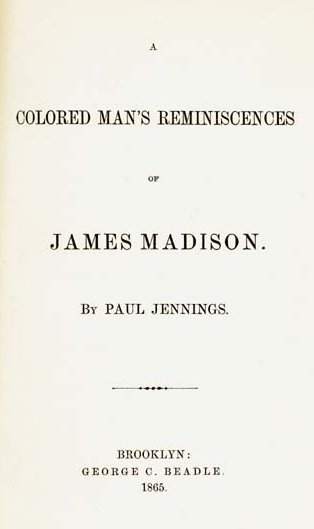Dublin Core
Title
A Colored Man's Reminiscences of James Madison
Subject
White House (Washington, D.C.)
Description
Paul Jennings was born into slavery on the family farm of James Madison, who was president during the War of 1812. During Madison's presidency and retirement, Jennings served as a "body servant," or valet, to Madison. After Madison's death he negotiated a series of sales which enabled him to secure his freedom. He became a prominent member of the free black community in Washington and worked for the federal government. In 1865, with the help of a coworker, he published this book of his memories of James and Dolley Madison.
Creator
Paul Jennings
Source
Documenting the American South. Read original.
Publisher
Brooklyn: G. C. Beadle
Date
1865
Coverage
Text Item Type Metadata
Text
Well, on the 24th of August, sure enough, the British reached Bladensburg, and the fight began between 11 and 12. Even that very morning General Armstrong assured Mrs. Madison there was no danger. The President, with General Armstrong, General Winder, Colonel Monroe, Richard Rush, Mr. Graham, Tench Ringgold, and Mr. Duvall, rode out on horseback to Bladensburg to see how things looked. Mrs. Madison ordered dinner to be ready at 3, as usual; I set the table myself, and brought up the ale, cider, and wine, and placed them in the coolers, as all the Cabinet and several military gentlemen and strangers were expected. While waiting, at just about 3, as Sukey, the house-servant, was lolling out of a chamber window, James Smith, a free colored man who had accompanied Mr. Madison to Bladensburg, gallopped up to the house, waving his hat, and cried out, "Clear out, clear out! General Armstrong has ordered a retreat!" All then was confusion. Mrs. Madison ordered her carriage, and passing through the dining-room, caught up what silver she could crowd into her old-fashioned reticule, and then jumped into the chariot with her servant girl Sukey, and Daniel Carroll, who took charge of them; Jo. Bolin drove them over to Georgetown Heights; the British were expected in a few minutes. Mr. Cutts, her brother-in-law, sent me to a stable on 14th street, for his carriage. People were running in every direction. John Freeman (the colored butler) drove off in the coachee with his wife, child, and servant; also a feather bed lashed on behind the coachee, which was all the furniture saved, except part of the silver and the portrait of Washington (of which I will tell you by-and-by).
I will here mention that although the British were expected every minute, they did not arrive for some hours; in the mean time, a rabble, taking advantage of the confusion, ran all over the White House, and stole lots of silver and whatever they could lay their hands on....
It has often been stated in print, that when Mrs. Madison escaped from the White House, she cut out from the frame the large portrait of Washington (now in one of the parlors there), and carried it off. This is totally false. She had no time for doing it. It would have required a ladder to get it down. All she carried off was the silver in her reticule, as the British were thought to be but a few squares off, and were expected every moment. John Susé (a Frenchman, then door-keeper, and still living) and Magraw, the President's gardener, took it down and sent it off on a wagon, with some large silver urns and such other valuables as could be hastily got hold of. When the British did arrive, they ate up the very dinner, and drank the wines, &c., that I had prepared for the President's party.
I will here mention that although the British were expected every minute, they did not arrive for some hours; in the mean time, a rabble, taking advantage of the confusion, ran all over the White House, and stole lots of silver and whatever they could lay their hands on....
It has often been stated in print, that when Mrs. Madison escaped from the White House, she cut out from the frame the large portrait of Washington (now in one of the parlors there), and carried it off. This is totally false. She had no time for doing it. It would have required a ladder to get it down. All she carried off was the silver in her reticule, as the British were thought to be but a few squares off, and were expected every moment. John Susé (a Frenchman, then door-keeper, and still living) and Magraw, the President's gardener, took it down and sent it off on a wagon, with some large silver urns and such other valuables as could be hastily got hold of. When the British did arrive, they ate up the very dinner, and drank the wines, &c., that I had prepared for the President's party.
